
Integrated Innovation Network
Hone

Three years ago, Antony Martin of Hone Agriculture and his team of 12 were just three PhD students in a sorghum field trying to breed the best version of the cereal grain for a biofuels project.
Now, they are wrapping up the development of a handheld light device which helps farmers test the chemical properties of soil, crops and grain samples, revolutionising what has traditionally been a very slow and arduous process.
Since his days with sorghum stalks, Antony and his two colleagues William Palmer and Jamie Flynn have become co-founders of Hone as well as software engineer Peter Tylee who joined the team early on as CTO.
Everything has happened so quickly that Antony sometimes has trouble believing it.
“You’re constantly thinking, ‘in six months’ time, it’s almost certain this will fall apart’, and then it doesn’t. And later you think the same and something else comes along,” Antony says. “Over time it gets more and more stable, and you start getting customers and return business and you think ‘okay, maybe we’re okay’.”
Previously called Rapid Phenotyping, Hone’s evolution makes for a good story.
Antony, Will and Jamie were working on their PhDs at the University of Newcastle. They’d been at university for ten years and were tossing up ideas on what to do next. They had a few options and had always been interested in starting a company that would make a positive global impact.
They decided to move forward with what would become Hone after a lucky break (as well as some highly supportive individuals at HMRI and UoN); they received funding to work from Hunter Medical Research Institute (HMRI) in a medical imaging lab providing the environment to test their initial idea for a handheld spectrometer. Within the hour of receiving that news, they also purchased a small farm, and started the company Hone. Three high-risk decisions for three struggling PhD students, but three decisions that provided a breeding ground for the development of new ideas and resulted in the products that underpin Hone Agriculture.
“Ever since that day we’ve been dealing with the consequences,” Antony jokes.
He explained their vision and what they’re currently developing.
“We are building a digital laboratory platform that consists of the handheld light device, a machine learning based development platform, and a phone app to deliver results to users. In the same way Apple has the iPhone, a software platform for developers to build new ‘apps’, and iOS software to sell those apps in their App Store; we’ve got a machine learning based developer platform that allows a community of developers who work in scientific labs to build their own applications to test for specific materials on our device which they can then list for others to use. It’s a great commercialisation pathway for laboratories as well as a valuable product for end users who can greatly reduce the cost and efforts of traditional testing.” he says.
Hone is currently focusing on building their device for soil and crop testing, but they have developers building applications on that same device to test other materials such as oils, blood and many additional sample types. They know the concept is expandable beyond agriculture.
“In the way that the iPhone can do 1,000 things, our device will be a lab in the palm of your hand. As our community of developers build out more applications, it will become widely applicable,” he says.
In 2016 the team participated in CSIRO On Prime program.
“It’s a great introduction for people in research to assess their idea in the market as rapidly as possible. It kind of forces researchers to talk to potential customers and get feedback. This isn’t a natural tendency of a researcher to want to get that confronting feedback,” Antony says. “For that project we realised one idea we were working on wasn’t commercially viable, so we didn’t pursue that and that was a great outcome”
In 2018 Hone received an Accelerating Commercialisation grant from AusIndustry and went from dabbling in a part-time passion to putting all their energy and efforts into this concept.
“It was only through the initial support of incredibly generous donors, HMRI and the University of Newcastle that we were able to kick start the lab and eventually develop the technology that underpins Hone,” Antony is quoted in the Newcastle Herald.
From HMRI, Hone moved into the Integrated Innovation Network (I2N) Hub on Hunter Street. Antony said it was great to leave the lab and feel a little bit more commercial.
“There’s a mental shift that happens when you move from a research environment and start thinking ‘we’ve got to pay the rent.’ That was a really good thing, and I2N were able to provide that business-thinking environment,” he says.
He added that the connections Hone made at I2N helped them raise their first round of seed capital.
Hone now have team members working from Melbourne, Sydney, the Gold Coast and Berlin.
“We raised money from local investors as well as grants through the government and early pilots with universities which supported us through to where we are now. We are now working with large agricultural companies and can see a bright future ahead of us” Antony says.
In May they received further recognition as the most promising Hunter-based startup when they pitched Hone and won at Hunter iF’s Pitch X competition.
Antony and his team at Hone are ambitious, but humble and grateful.
“In the early stages, having someone to support you off the back of nothing is amazing. Without that, we could never have gotten started,” he says.
The University of Newcastle acknowledges the traditional custodians of the lands within our footprint areas: Awabakal, Darkinjung, Biripai, Worimi, Wonnarua, and Eora Nations. We also pay respect to the wisdom of our Elders past and present.



